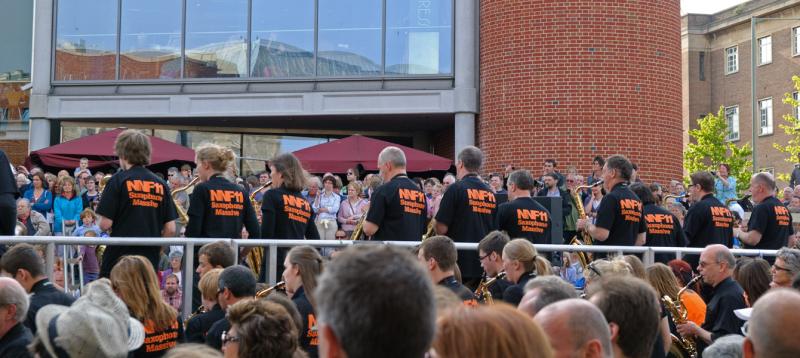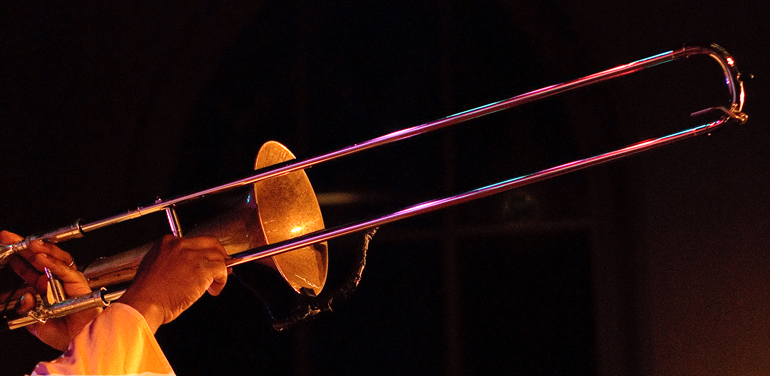Home » Jazz Articles » JazzLife UK » Eat Worms Or Be Loved
Eat Worms Or Be Loved

It's a big question and demands a big answer. In fact, it's two big questions. Has jazz gone horribly wrong? If it has, how can it be fixed? For the sake of the rest of this article, I'll answer the first question in the affirmative. But please note this caveat: my opinions do not necessarily reflect the views of the entire UK jazz community, despite what many people think.
As Private Fraser Would Say, "We're All Doomed."
Yes, it has gone wrong. Terribly wrong. Jazz is no longer America's Number One Music (if, indeed, it ever was): jazz acts no longer appear on top nationwide TV shows, although Robert Glasper managed to pop up on the David Letterman and Jay Leno shows in the same month; clubs are closing across the globe; fees are down; CD sales are plummeting; sheet music sales are in steep decline; and piano roll production has almost ceased.
In the UK, BBC Radio 3 has shuffled a couple of its jazz programs about: a move that apparently ranks with Thatcher's destruction of the British mining industry in terms of its impact on the social fabric of the country. It's cancelled the venerable Jazz Library and both moved the timeslot for Jazz Record Requests and changed its presenter, with Jazz Library's presenter Alyn Shipton taking over Jazz Record Requests from Geoffrey Smith, who gets a new show titled Geoffrey Smith's Jazz. In other words, the amount of hours Radio 3 devotes to jazz is apparently unchanged, it's just that one presenter is now on later in the evening and the other is on earlier.
Jazzwise magazine described the BBC's plan as a "disheartening move that will dismay jazz fans": a description that seems to suggest that said fans are unaware of the Internet and the marvelous iPlayer, which may well be true. As someone who rarely listened to either show—although I always loved the notion of record requests in this digital age—I must admit to a lack of both dismay and discouragement. Jazz-loving DJ Gilles Peterson left BBC Radio 1 recently, a move that may well mean Radio 1 stops playing jazz altogether. I'm much closer to being dismayed by this than by Radio 3's shuffle; even though Peterson is still playing jazz on BBC radio he's moved to Radio 6 Music, a digital-only station with a much smaller listenership than Radio 1.
Faced with such grave problems, certain sections of the jazz community—including some who deny such a community's very existence—have rallied to the cause. Tired of being creative, informative or entertaining they are devoting their energies to enthusiastic discussion of the place of jazz in the wider social milieu, its role in shaping the prevailing zeitgeist or, even more excitingly, to questioning the validity of the very word "jazz." I must admit, I'm gripped by any discussion of a prevailing zeitgeist, but I'm not convinced that such a debate is doing much to engage with the potential jazz audience, or with potential jazz musicians.
For the sake of simplicity, I'll avoid adding my two pennies' worth to these debates. I'll accept that "jazz" is a valid term and stick to my own straightforward definition of the musical genre in question: "a form of music that combines the many talents of its performers and composers with the apathy and disinterest of the bulk of its potential fan base." Little to argue about there, I feel. But how can this apathy be dealt with? It's simple.
Jazz Is A Piece Of Cake
"Nobody loves us, everybody hates us, just 'cos we eat worms." So, slightly paraphrased, sang '70s Brit-punk band The Yobs. It's a sentiment that we can all share and a neat summation of the Jazz Conundrum. Eat worms, or be loved: there is no middle ground.
No artistic pursuit was ever loved because of its technical complexity. Admired or respected perhaps, but never loved. Art is loved for what it brings to the lives of its audience. So let's forget about the "jazz is really difficult" angle. Let's stop putting so much emphasis on the travails of the musician, the complexity of the compositions, the sheer life-threatening risks involved in playing a small cellar club in Cleckheaton. Let's remind people how easy jazz actually is: to listen to, to participate in, to talk about and to enjoy.
Strip away the obfuscation: jazz is really simple. Let's stop putting people off by speaking of it as a "challenging" musical form. Yes, there are those who consider "challenging" to be a positive concept, but they are in a minority. For every single person who would view it as a personal triumph if they built a toboggan out of matchsticks and then careered down Mount Everest on it there are 100,000 whose greatest challenge would be tracking down the internet video of the resulting crash. Jazz is easy: let's start telling people, let's get them involved.
It's simple to play. Every major jazz instrument can be mastered with relative ease (okay, mastered may be overstating things a tad, but not much more). Take the drums: hit them with a couple of sticks, hit them again, hit them three or four times in succession. Great. Children do it as soon as they can pick up sticks. Mostly, it works. The same rule applies to vibes, xylophone and marimba.
The guitar has six strings, which can make it quite difficult to play, but they can all be hit at once, which is quite easy to do. With luck, this will make an enjoyable noise. The bass only has four strings. Only four and they can be hit one at a time. What's so difficult? A saxophone has many valves, keys and bits of felt but these are mostly for show. Blow into one—especially a baritone—and small children will laugh at the sound you create. If there is anything better than making small children laugh, I don't know what it is.

The piano and the trumpet are both actually quite hard to play and so are rarely heard in jazz. As they are so time consuming to learn, I would suggest not bothering: the stylophone or the trombone (pictured above) seem like much simpler alternatives.
Singing is rather straightforward: it can even be done while playing an instrument. In jazz you can even do singing without having to remember any words, which is excellent news. Song selection is also unproblematic. Literally hundreds of songs have already been written. With so many to choose from there's no need to write any new ones.
Of course, there's also free improvisation. It's probably the best place for the neophyte jazz player, as it involves making stuff up as you go along without having to remember it for next time. Solo improvisation removes the need to leave gaps in your playing so that other people can have a turn. Both forms of free improvisation can be practiced at home without an audience: this also gives you the genuine "free improvisation in a club" experience.
Dancing About Architecture
For the non-musician who might wish to enter the world of jazz, there's always photography or creative writing (sorry, I mean jazz journalism). Photographing jazz musicians is very easy these days as the camera does all the hard work—except for the blagging of an Access All Areas photo pass and the standing around looking cool and making sure that everyone can see your Access All Areas photo pass. If the musicians move around on stage then this can cause problems for the photographer but luckily most jazz musicians are getting on a bit, so they tend to stay in one place.
Writing about jazz, however, is very, very, difficult. It takes a special talent to absorb the required knowledge, to keep up with the unrelenting stream of new music and Miles Davis reissues and to be able to use six words and eighteen syllables when an individual, one syllable, linguistic unit would be unutterably apposite and appropriate. It's best to leave this to the experts, such as myself.
So: jazz is simple (except for the writing). Spread the word.
What's Wrong With The British Jazz Scene This Month?
Well, it seems to contain at least one antsy jazz writer who thinks he has the answer to everything. Actually, it contains lots of antsy jazz writers who think they have the answer to everything, but only one that I can vouch for unequivocally.
 There's also been some genuinely sad news for all music lovers, not only jazzers. Just as this JazzLife UK column was being finalized news came of the deaths of Levon Helm and British guitar great Bert Weedon (pictured left).
There's also been some genuinely sad news for all music lovers, not only jazzers. Just as this JazzLife UK column was being finalized news came of the deaths of Levon Helm and British guitar great Bert Weedon (pictured left).Both men were masterful musicians: never flashy, always conscious that the music comes first. Weedon's death is especially poignant for the many thousands of guitarists of a certain age who first learnt to bash out a chord or two thanks to his massively popular guitar tutor book Play In A Day (International Music Publications). First published in 1957, it's the book that helped Eric Clapton and Brian May, among many others, to get started on their chosen instrument. Weedon was also a regular presenter on children's television—he's one of the first guitarists I ever saw on TV, and the first one that I could name. When I met him, briefly, at a guitar auction in the late-'90s, he came across as a modest, charming, gentleman with a ready smile and a willingness to stop and talk with anyone who approached him.
Weedon got it right with Play In A Day: tell 'em it's easy, get them started. He meant it when he claimed the guitar could be played in a day: not like he could, not like Andrés Segovia, not like Scotty Moore, but recognizable tunes could emerge in less than 24 hours. The influential Mr Weedon was even immortalized in song by one of the grooviest groups of the '60s, the Bonzo Dog Doo Dah Band: "We are normal and we dig Bert Weedon," they sang. We should all be so normal.
On the brighter side, the 2012 Parliamentary Jazz Award nominations showcase the breadth and depth of talent in the increasingly vibrant UK jazz scene. On the downside, only two of my nominees have made it through to the shortlist (but I'm not saying which two).
And there are only eight months to go until the JazzLife UK Gilded Butterfly Awards 2012.
Photo Credits
Bert Weedon: Courtesy of Bert Weedon
All others: Bruce Lindsay
< Previous
Me, Myself and I
Comments
Tags
For the Love of Jazz
 All About Jazz has been a pillar of jazz since 1995, championing it as an art form and, more importantly, supporting the musicians who create it. Our enduring commitment has made "AAJ" one of the most culturally important websites of its kind, read by hundreds of thousands of fans, musicians and industry figures every month.
All About Jazz has been a pillar of jazz since 1995, championing it as an art form and, more importantly, supporting the musicians who create it. Our enduring commitment has made "AAJ" one of the most culturally important websites of its kind, read by hundreds of thousands of fans, musicians and industry figures every month.



















